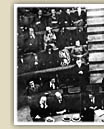
The manifesto of 17 October on 'the exemplary
punishment of the enemies of the fatherland' was characteristic of the climate prevailing
at the time.
Neither public opinion nor foreign observers was surprised by these events.
The shadow of the defeat became an increasingly sensitive issue and the search for those responsible
(for what was seen as treason) was emphasized by the rebellious officers as an immediate
priority. This perspective further determined the ideology and practice of the coup in blaming the trials the country was suffering on 'treason' and 'foreign intervention'.
The demand for the anticipated purge resulted in the bringing to trial
(and eventually sentencing to death) of the officers who had been running the country
in the previous years, in what became known as the Trial of the Six.
To bring to trial the leading figures of the group that had held power since 1920,
with the charge of 'high treason', was undoubtedly an act of political expediency.
Independently of the undoubted responsibility of those arraigned, the indictment was not
formally valid.
This, however, did not prevent the pronouncement of the death penalty on six of them -
Georgios Hatzianestis (Commander-in-Chief), Dimitrios Gounaris, Nikolaos Stratos, Petros Protopapadakis,
Georgios Baltatzis, Nikolaos Theotokis (statesmen and leading figures of the Popular Party) - despite
the resolute efforts of the Great Powers to intervene in their favour.
|
 |
